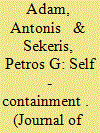|
|
|
Sort Order |
|
|
|
Items / Page
|
|
|
|
|
|
|
| Srl | Item |
| 1 |
ID:
110542


|
|
|
|
|
| Publication |
2011.
|
| Summary/Abstract |
In committee deliberation, requiring a unanimous vote intuitively provides the strongest incentives for actors to share fully their opinions and private information. It is also believed that full revelation of (decision-relevant) information occurs when personal biases are made clear before deliberation. However, recent literature suggests that both intuitions are flawed. Austen-Smith and Feddersen propose a model in which the unanimity rule performs worse than other rules in promoting fully revealing deliberation, and uncertainty about individuals' preferences promotes full sharing of information. We extend this work by incorporating the possibility that individuals may provide verifiable evidence for their private information. Under this circumstance, we demonstrate that Austen-Smith and Feddersen's results are reversed. First, a unanimous voting rule performs better than any other, as unanimity is the only rule that always promotes fully revealing deliberation. Second, under fairly general conditions, uncertainty about individuals' preferences prevents full sharing of information.
|
|
|
|
|
|
|
|
|
|
|
|
|
|
|
|
| 2 |
ID:
146148


|
|
|
|
|
| Summary/Abstract |
In conventional crisis bargaining models, bluffing provides the primary rationale for states to misrepresent their private information, and war occurs because strong states are unable to credibly demonstrate strength to their opponents. Here, I argue that military strategy supplies an alternative reason for states to misrepresent their private information. Both strong and weak states may misrepresent themselves because of the battlefield benefits of fighting against an uninformed opponent, who may choose a suboptimal military strategy. Under appropriate conditions, the military gains for concealing information exceed the diplomatic gains available for revealing that information. Thus, states will choose to keep secrets and fight. To demonstrate this, I incorporate military strategy into the standard bargaining framework, showing that military concerns incentivize both strong and weak states to conceal information, even when they are able to reveal that information costlessly and credibly. As in the usual model, war may occur when states underestimate their adversaries, but it may also occur when states overestimate their adversaries. I further show that a mere willingness to fight does not reveal that a state is strong. I conclude the paper with two brief case studies.
|
|
|
|
|
|
|
|
|
|
|
|
|
|
|
|
| 3 |
ID:
150995


|
|
|
|
|
| Summary/Abstract |
In anarchic settings, potential rivals can be dragged into arms races degenerating in open wars out of mutual suspicion. We propose a novel commitment device for contestants to avoid both arming and fighting. We assume that the military decides the armament levels of a country, while the civilian decides whether to attack a rival country. When these decision-making bodies perfectly communicate, the decision makers are unable to credibly communicate to their foe their willingness not to arm and not to attack, thus implying that war ensues. With imperfect information, however, peace may ensue as countries credibly signal to their rival a more peaceful stance since contestants are more reluctant to enter in an armed confrontation with a potentially understaffed army. Using data on the 1975 to 2001 period, we provide supportive evidence that in countries where the head of the state or the defense minister are military officers, and are therefore better informed of their armies’ fighting preparedness, the likelihood of observing an international conflict is higher.
|
|
|
|
|
|
|
|
|
|
|
|
|
|
|
|
|
|
|
|
|